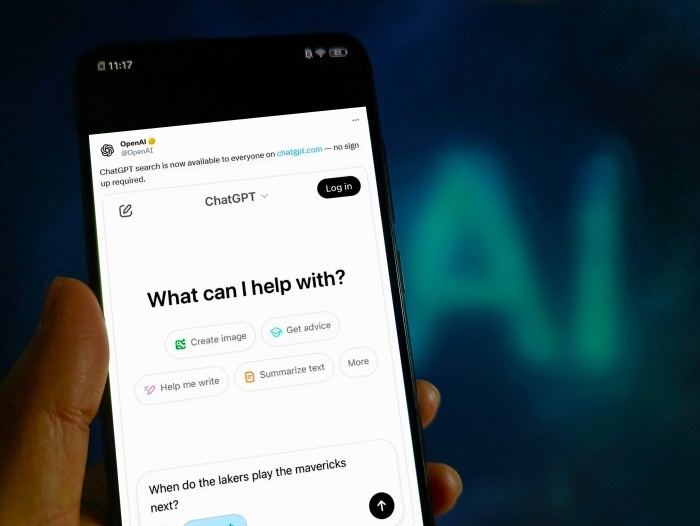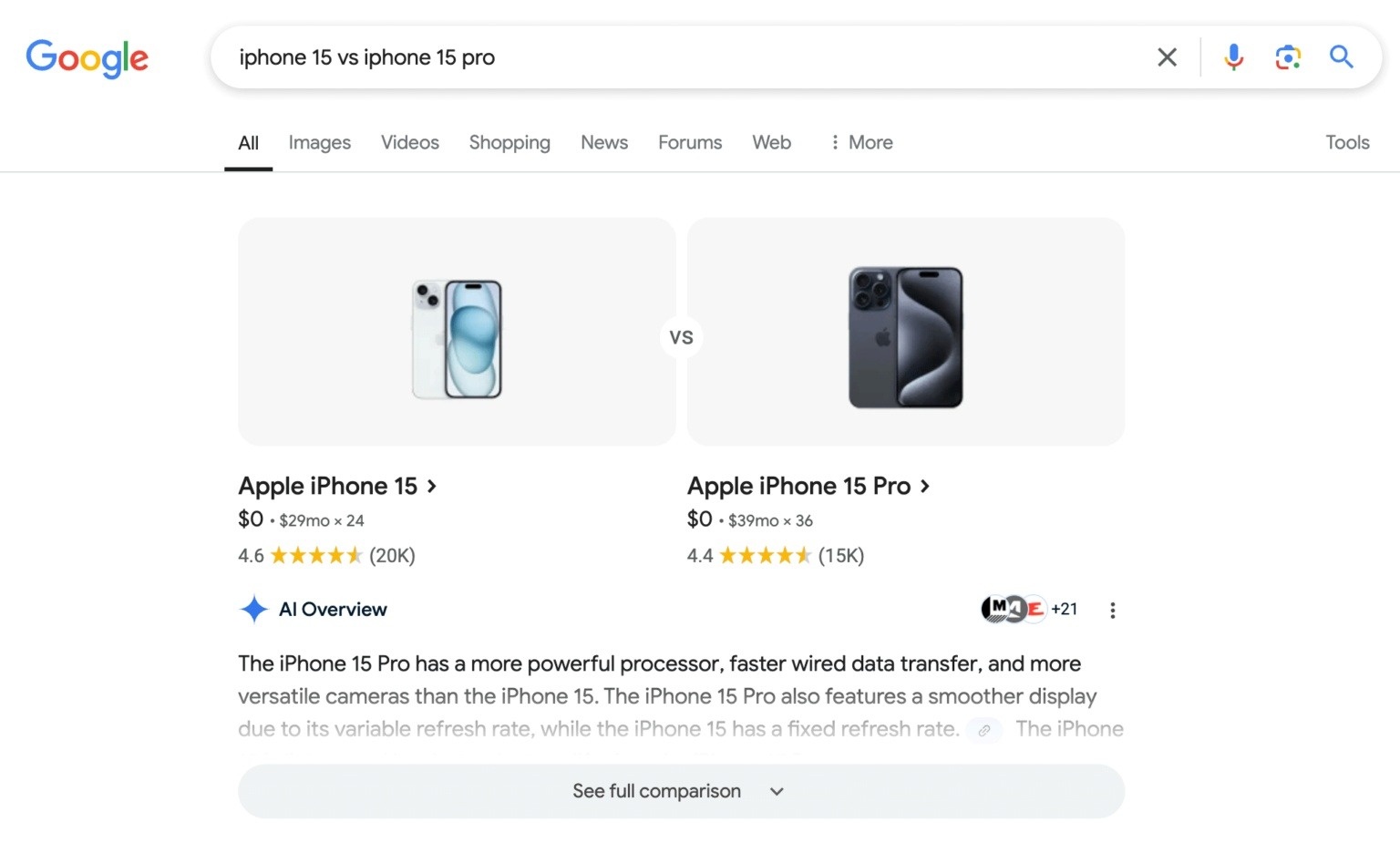
In just a few months, AI has begun to change the way users search for information online in ways that are causing concern among marketing professionals.
Instead of using traditional search engines like Google and Bing, users are now greeted at the top of search results with AI-generated topic summaries. Furthermore, an increasing number of users are now directly turning to large language models like ChatGPT to answer everyday questions or request shopping guidance.
Change to survive.
According to the WSJ , both of these developments have begun to "erode" click-through rates and website traffic—something that marketing professionals have painstakingly built up by spending millions of dollars on search engine optimization, or SEO.
More importantly, the emergence of AI has also created a new wave for emerging startups specializing in new acronyms in the advertising industry. Notable examples include engine generation optimization (GEO), response engine optimization (AEO), and especially artificial intelligence optimization (AIO).
According to Ellen Mamedov, global head of search optimization for email software platform Intuit Mailchimp, the company has seen a steady decline in web traffic since AI-powered search engines have allowed users to gather information about the company and its products without visiting its website.
 |
According to OpenAI, ChatGPT currently processes over one billion searches per week. PHOTO: Zuma Press. |
To cope with this shift, Mamedov said Mailchimp had to start updating its websites to better serve crawlers. This term refers to bots whose job is to access websites to collect data, which is then used to provide answers on AI platforms such as ChatGPT and Google's Gemini.
Compared to traditional search engines, technical factors such as page load speed and the code used to track user activity are crucial for crawlers and AI-based search, according to Mailchimp's research.
According to Ms. Mamedov, crawlers are designed to absorb and process information as quickly as possible. That's why they prefer websites that load faster and are optimized for machines rather than for human readers.
Furthermore, the Mailchimp director even predicted that websites will soon only serve as data sources for AI platforms, rather than being destinations for users as they once were.
The decline of traditional tools
According to new research from Adobe, AI-powered search has become a crucial traffic channel for retailers.
Specifically, the report analyzed “over 1 trillion visits to retail websites in the US” through the platform, and also conducted a survey with “over 5,000 respondents in the US” to better understand how users utilize AI.
Survey results indicate that traffic from AI-powered search surged 1,300% during the 2024 holiday season compared to 2023. These are significant growth figures and were somewhat predictable, especially given that the demand for AI chatbot-based search is still in its infancy.
What's even more interesting are the interaction metrics. Users navigated by AI, compared to conventional search sources like Google or Bing, tend to stay on the website 8% longer, browse other pages 12% more often, and are 23% less likely to leave.
The Verge suggests this demonstrates that AI tools may be directing users to more relevant websites than traditional search.
According to Joy Howard, marketing director at Back Market, a refurbished electronics marketplace, searches via large language modeling (LLM) haven't boosted sales and only account for 0.2% of website traffic.
 |
Google AI Overview is powerful in search results leading to e-commerce sites. Image: Search Engine Land. |
However, Howard stressed that such traffic was already 470 times higher than in the summer of 2024, and is expected to continue to increase.
This has led Back Market to adjust its SEO activities accordingly. Specifically, the company is focusing more heavily on updating individual product pages, as some consumers are increasingly using chatbots to identify products that match their needs and preferences.
Users will then use search engines to locate products before purchasing them, Howard said. Additionally, Back Market has begun using a more conversational tone in its product descriptions.
This is because the website's research team discovered that LLMs like ChatGPT prefer natural, conversational language over detailed descriptions, which are considered the best approach in traditional search engines.
"SEO teams were caught off guard. Traffic, rankings, average position, and click-through rates... none of those metrics hold any meaning for the future," said Nikhil Lai, principal performance marketing analyst at Forrester.
Source: https://znews.vn/ai-thay-doi-cuoc-choi-internet-post1552271.html



![[Photo] General Secretary To Lam receives President of the European Council Antonio Costa](/_next/image?url=https%3A%2F%2Fvphoto.vietnam.vn%2Fthumb%2F1200x675%2Fvietnam%2Fresource%2FIMAGE%2F2026%2F01%2F29%2F1769697816651_a1-bnd-5216-9741-jpg.webp&w=3840&q=75)




















































































![OCOP during Tet season: [Part 3] Ultra-thin rice paper takes off.](/_next/image?url=https%3A%2F%2Fvphoto.vietnam.vn%2Fthumb%2F402x226%2Fvietnam%2Fresource%2FIMAGE%2F2026%2F01%2F28%2F1769562783429_004-194121_651-081010.jpeg&w=3840&q=75)


![OCOP during Tet season: [Part 2] Hoa Thanh incense village glows red.](/_next/image?url=https%3A%2F%2Fvphoto.vietnam.vn%2Fthumb%2F402x226%2Fvietnam%2Fresource%2FIMAGE%2F2026%2F01%2F27%2F1769480573807_505139049_683408031333867_2820052735775418136_n-180643_808-092229.jpeg&w=3840&q=75)
![OCOP during Tet season: [Part 1] Ba Den custard apples in their 'golden season'](/_next/image?url=https%3A%2F%2Fvphoto.vietnam.vn%2Fthumb%2F402x226%2Fvietnam%2Fresource%2FIMAGE%2F2026%2F01%2F26%2F1769417540049_03-174213_554-154843.jpeg&w=3840&q=75)





Comment (0)